Charlie Chan in the
Secret Service (1944) – 5.0
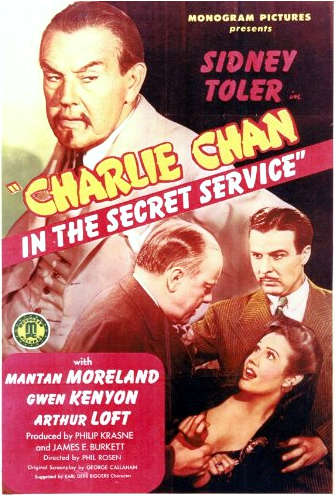
After Castle in the Desert in 1942 Fox dropped the Charlie Chan film series and so Sidney Toler got the rights to the character from the widow of Earl Derr Biggers, the creator of Charlie Chan, and went to Monogram Pictures to renew the series. Monogram was a solid but much lower budget studio than the big ones and was grouped into a number of studios that were termed Poverty Row. Their budgets were about a tenth what the big studios were, but they lasted from the early 1930's to the early 1950's and produced a lot of films - one being the Mr. Wong series with Boris Karloff also doing Yellow Face.
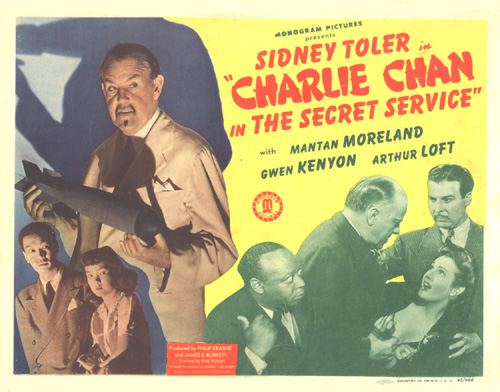
This lower budget is immediately obvious in this film when for whatever reason Chan is tracked in detail as he travels from his office to the murder location just to fill up time. The war effort was on and Chan is now doing his duty as an investigator for the Secret Service. When a scientist is killed and his plans are stolen, Chan has to get to the bottom of it and all the many suspects. Not a lot of it seems logical, but the film does introduce the audience to two new characters who are to appear in many of the Chan films to follow.
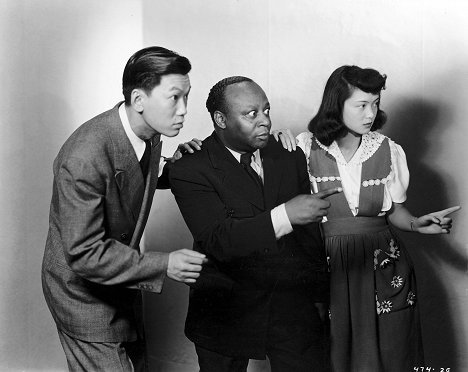
With the switch in studios, Son Number Two played by Victor Sen Yung in many films was out and Son Number Three played by Benson Fong was in. Fong would go on to a very lengthy career and appear in loads of TV episodes. Monogram had already signed up Mantan Moreland to appear in some films with Frankie Darrow and he becomes a running part of the Charlie Chan films. Looking back at Moreland's humor from today it obviously is very racist, but at the time he was extremely popular and within the confines of accepted stereotypes for black comedians of the time, Moreland had moments of genius - shown to better advantage in some later Chan films than in this one. Marianne Quon plays Chan's very cute daughter who like all the other siblings wants to follow in dad's footsteps. Marianne was only to appear in a handful of other films.
Charlie Chan in the Chinese Cat (1944) – 6.0

This is a very different kind of Chan film and I quite liked it. Nearly every one of his films that I have seen has a basic set-up of someone getting murdered, a buffet of suspects and then the round up when he brings all the suspects together and names the killer - often tricking the killer into revealing himself. This was nothing like that except for the murder of course. That happens in the first minute of the film and there are really no suspects - more of a gang that Charlie brings to justice and he shows more toughness than he ever has. So much for the later criticisms of Chan for portraying an effete Chinese man. And he actually stands by and watches his Son #3 Tommy (Benson Fong) get tortured rather than giving in. A surprisingly violent scene for a Charlie Chan film.
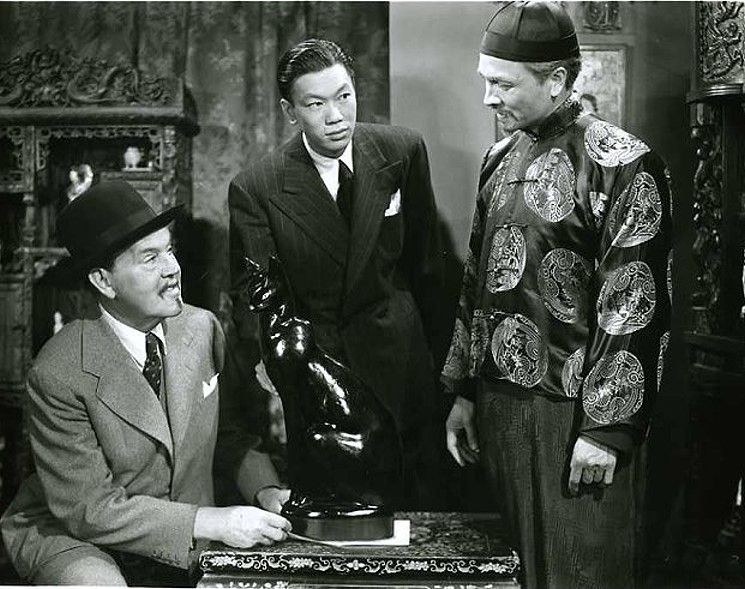
Mantan Moreland who had been in Washington DC for the previous film shows up in San Francisco again as constant comic relief - this time as a taxi driver - and he has some funny lines here and the usual reactions for which he is famous for. He also tries getting it on with the black maid. The film opens with a murder as a man slips through a secret passage and shoots Manning at his desk. Before dying under the gaze of a black cat statue Manning throws all the chess pieces off the board except for the lone bishop. Quick thinking for a dying man. Months later the murder remains unsolved and the daughter (Joan Woodbury who keeps her sex appeal under wraps here) of the dead man goes to a visiting Chan and asks for his help. But I only have 48 hours. Tommy pipes up that his dad can do it. In fact Charlie bets another man $2,000 that he can - payable to the Chinese Orphan Relief Fund. Good solid film. It takes place in San Francisco with a finale in a Fun House and the fog machines went into overdrive.
Black Magic (1944) – 5.5 – Aka – Meeting at Midnight
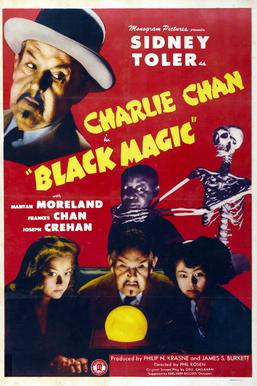
Oh no, not another film with séances and mediums and murder! And hypnotism not to mention a cigar case that kills! Average enough mystery that is lifted up by the appearance of Mantan Moreland and one of Charlie’s daughters. He calls her The Beauty of the Chan family. These two actually dominate the film to some extent with the comic antics of Birmingham Brown (Mantan Moreland, who gets more air time with each film) and by her adorable charm. All the sons were elsewhere I guess. She is played by Francis Chan (also the name of her character) with a ready smile and brains. I wish she was Charlie’s assistant in all his films. Interestingly, Francis Chan only showed up in six films before she married (for 60 years and five children) and got out of the business, but one of the films was the 1933 Charlie Chan's Greatest Case with Warner Oland - where she plays a young Chan daughter. It is unfortunately a Lost Film. She had been on the cover of Look Magazine as one of a group of Chinese women keeping Chinese pilots company.

During a séance the medium is murdered but there is no gun or bullet found. Co-incidentally, Charlie Chan’s daughter was attending and Birmingham Brown had just started working there. Charlie has no option except to look for the killer. A very clever killer who uses magic, hypnosis and drugs to do his dirty deeds. But not clever enough for Charlie. The director Phil Rosen directed a ton of films in his career, but mainly low budget ones like this. He directed the first five Chan films for Monogram and does fine with a miniscule budget. The script writer is George Callahan who wrote eight of the Monogram Chan films

Charlie Chan in the Jade Mask (1945) – 6.5
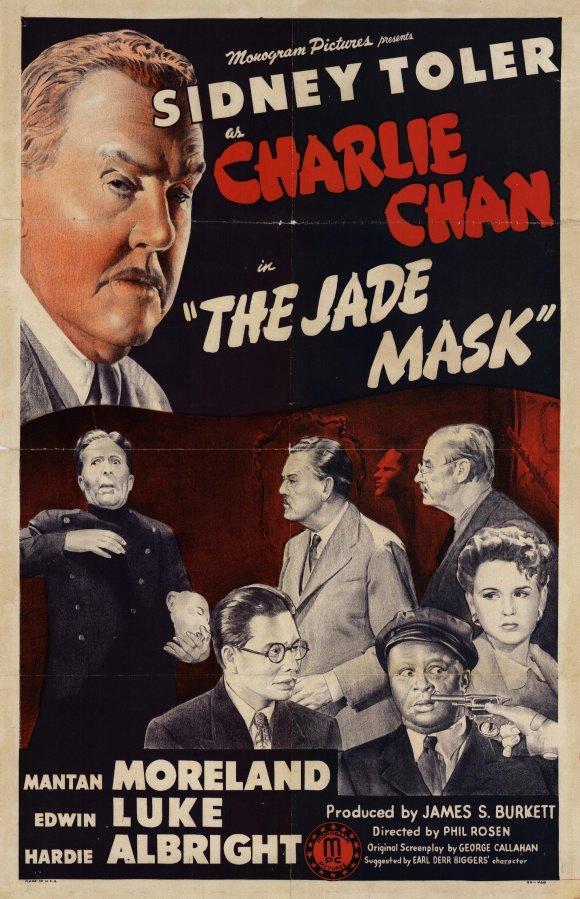
Suspects are dropping like flies in this solid Charlie Chan offering. Like most of the Monogram Chan films much of it takes place in one large house in order to save costs in production but it is a strange old house with fog always surrounding it, weird scientific experiments going on inside, death masks of all the people hanging on the walls, hidden rooms, voice codes, poison gas, ventriloquists, puppets, poison needles out of nowhere, dead men walking and so on. Chan of course with the "help" of Birmingham Brown and Son Number 4 weave's his way through it to a solution. A solid Chan outing that keeps the killer’s identity under wraps till the big reveal.
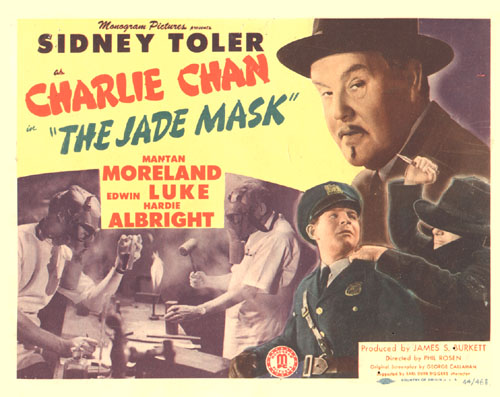
A terrific B beginning to the film. The large mansion surrounded by gates and fog and inside a bunch of human snakes who all hate each other and on the outside someone trying to sneak in. And a mad scientist with a gas formula that everyone wants including the government as we are still at war. Which explains the absence of Son 2 (Victor Sen Yung) and Son 3 (Benson Fong) who were both in the military (in real life I mean. So we have Son 4 (Edwin Luke) in his only appearance in the Chan series. It is a shame they did not bring back Daughter 1 – The Chan Beauty from the previous film, Black Magic. When the scientist and head of the household is murdered with a poison needle they bring in Charlie who as usual is packed to go elsewhere. Later one of the household tells Chan I know who it is – give me five minutes and I will be back. You know he will soon be making his exit from the film. With the able assistance of Son 4 and Birmingham Brown (Mantan Moreland) Charlie solves the case. At the end Charlie thanks his two assistants – “I can’t think of any way in which you helped but if I do I will let you know”. Benson Fong is back for the next one.
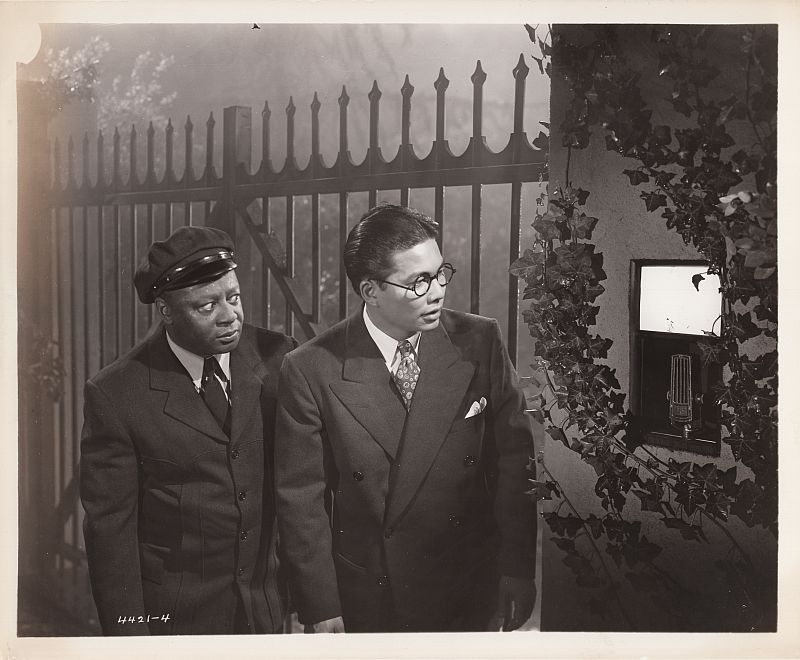
It was nice seeing Al Bridge as the slow talking sheriff have a solid role. He has nearly 300 film credits going back to 1931 – often in Westerns - but generally only for a few minutes but always leaves an impression. One of his more famous roles was as the sadistic warden of the prison in Sullivan's Travels.
The Scarlet Clue (1945) – 7.0
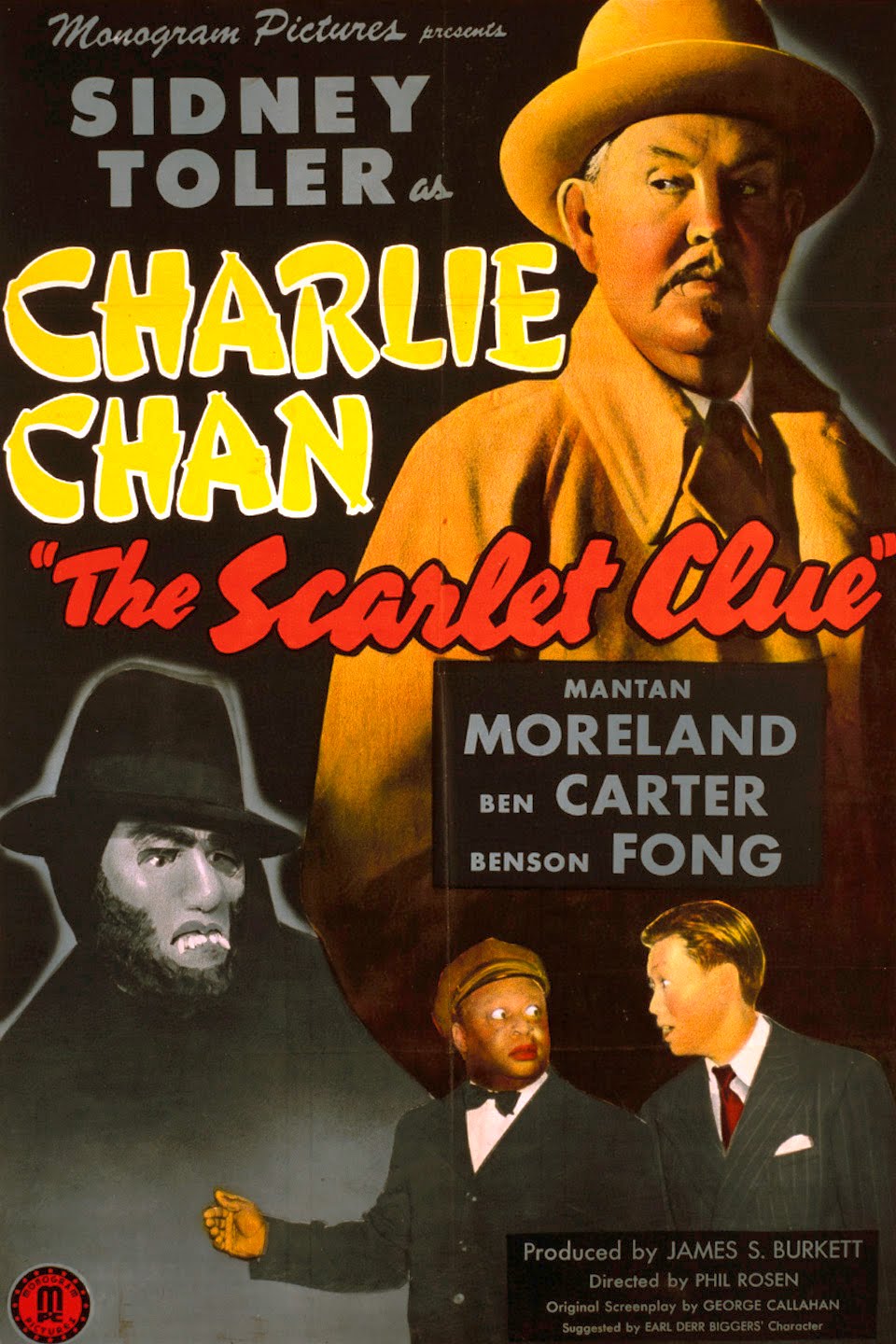
A very solid Monogram Chan film as he tracks down a mastermind enemy agent. Lots of people die along the way in various manners of murder from poison gas to old fashioned stabbing and disappearing elevator doors. Toler looks a bit bored by now and the film gives a lot of time to the antics of Mantan Moreland and son #3 Benson Fong who was back from the army. This is actually a plus because Moreland was a treasure and Fong is an ok straight man. Moreland meets up twice with Ben Carter to perform "incomplete sentence" routines that they performed in vaudeville together. The "incomplete sentence" routine works this way. One of them will begin a sentence and the other will know what he is going to say before he says it and replies but the other person knows what he is going to say and replies and it goes back and forth and back and forth. The timing has to be perfect. Sort of like "Last week I", "Sorry but I wasn't home but", "Oh that had to be", "It was because", "Sorry I have no", "Sure I understand". Carter was an interesting figure - besides appearing in films and vaudeville he was also an agent for black talent and an activist for civil rights.
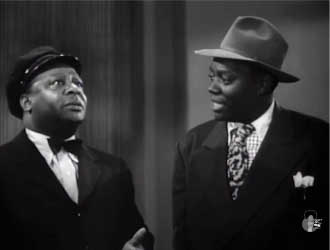
Mantan had come up through vaudeville beginning in the 1920s and into the 30's before he started appearing in films - first in race films and then as comedy relief in Hollywood films. He was now a team with Carter off the screen. Carter is actually billed third in this film - which had to be a rarity for two black actors to be billed second and third in a Hollywood production with a Chinese man fourth. The actor in yellow-face was first of course. Carter appears in one more Chan film but tragically died in 1946 from diphtheria. My guess is that these routines were straight out of their shows.
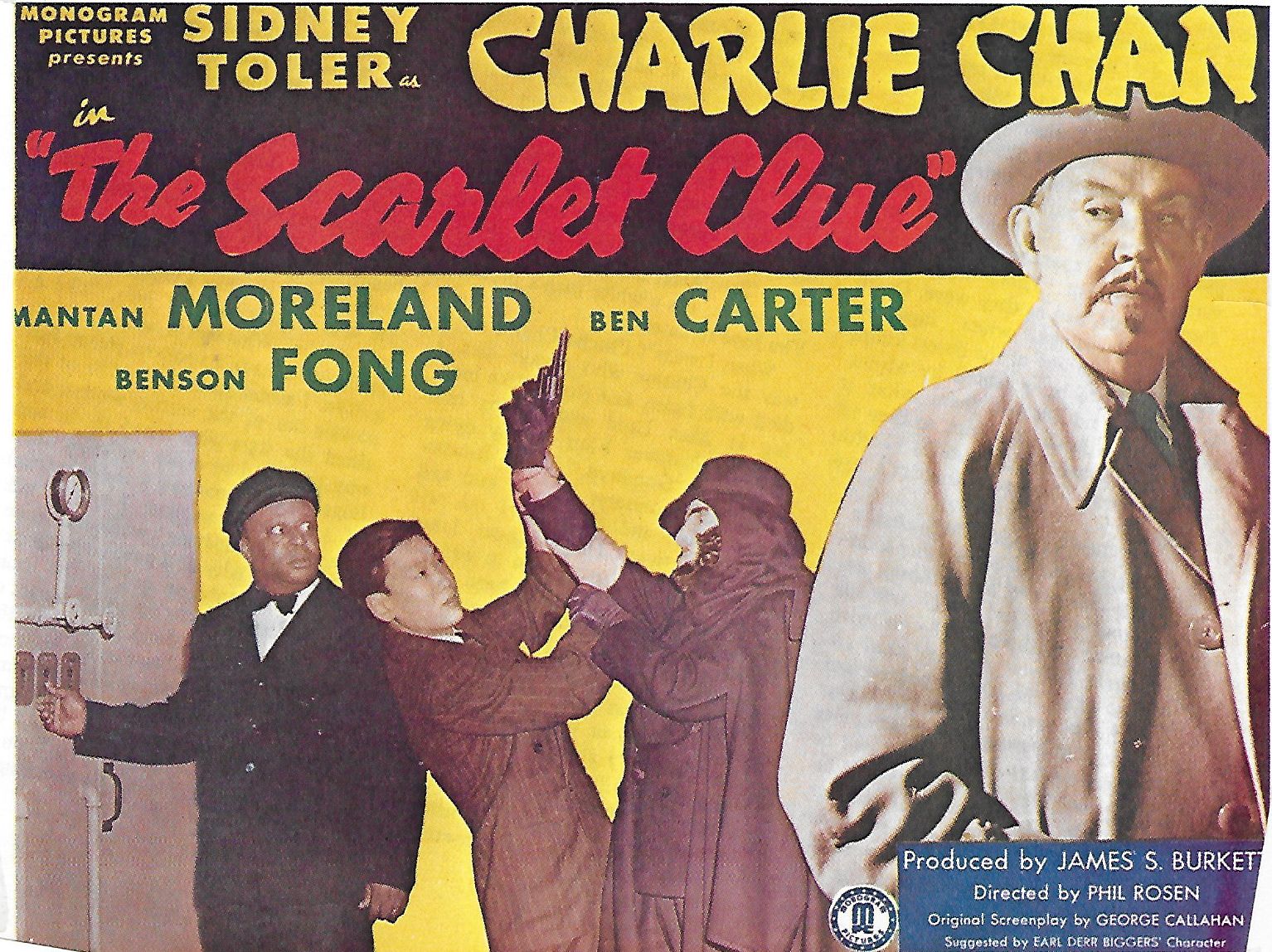
I may have missed it but I have no idea what the Scarlet Clue is. Someone is stealing radar secrets for the enemy and Charlie and his two assistants are on the case. In the San Francisco fog Charlie follows one man and finds him dead. It all leads back to a radio show with a group of suspects. Technology has a hand in this - the Big Boss uses teletype to send instructions to his subordinates, there is a device that pulls the floor out of an elevator, a poison gas that only works if a cigarette is lit next to it and this being 1945 you can be sure someone will light up and a series of rooms that test radar in hot and frigid cold temperatures. Throw in a few decent Chan aphorisms and you have 60-minutes of B entertainment. This was director Rosen's fifth straight but last Chan film.
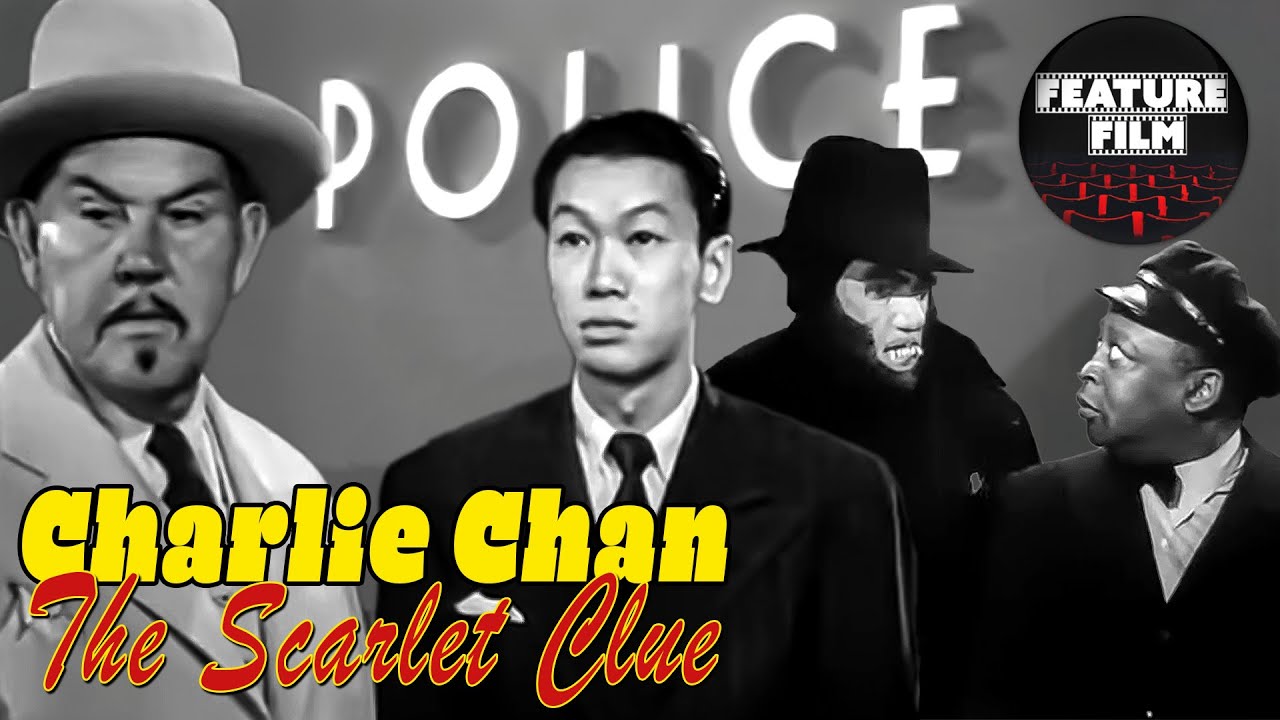

After Castle in the Desert in 1942 Fox dropped the Charlie Chan film series and so Sidney Toler got the rights to the character from the widow of Earl Derr Biggers, the creator of Charlie Chan, and went to Monogram Pictures to renew the series. Monogram was a solid but much lower budget studio than the big ones and was grouped into a number of studios that were termed Poverty Row. Their budgets were about a tenth what the big studios were, but they lasted from the early 1930's to the early 1950's and produced a lot of films - one being the Mr. Wong series with Boris Karloff also doing Yellow Face.

This lower budget is immediately obvious in this film when for whatever reason Chan is tracked in detail as he travels from his office to the murder location just to fill up time. The war effort was on and Chan is now doing his duty as an investigator for the Secret Service. When a scientist is killed and his plans are stolen, Chan has to get to the bottom of it and all the many suspects. Not a lot of it seems logical, but the film does introduce the audience to two new characters who are to appear in many of the Chan films to follow.

With the switch in studios, Son Number Two played by Victor Sen Yung in many films was out and Son Number Three played by Benson Fong was in. Fong would go on to a very lengthy career and appear in loads of TV episodes. Monogram had already signed up Mantan Moreland to appear in some films with Frankie Darrow and he becomes a running part of the Charlie Chan films. Looking back at Moreland's humor from today it obviously is very racist, but at the time he was extremely popular and within the confines of accepted stereotypes for black comedians of the time, Moreland had moments of genius - shown to better advantage in some later Chan films than in this one. Marianne Quon plays Chan's very cute daughter who like all the other siblings wants to follow in dad's footsteps. Marianne was only to appear in a handful of other films.
Charlie Chan in the Chinese Cat (1944) – 6.0

This is a very different kind of Chan film and I quite liked it. Nearly every one of his films that I have seen has a basic set-up of someone getting murdered, a buffet of suspects and then the round up when he brings all the suspects together and names the killer - often tricking the killer into revealing himself. This was nothing like that except for the murder of course. That happens in the first minute of the film and there are really no suspects - more of a gang that Charlie brings to justice and he shows more toughness than he ever has. So much for the later criticisms of Chan for portraying an effete Chinese man. And he actually stands by and watches his Son #3 Tommy (Benson Fong) get tortured rather than giving in. A surprisingly violent scene for a Charlie Chan film.

Mantan Moreland who had been in Washington DC for the previous film shows up in San Francisco again as constant comic relief - this time as a taxi driver - and he has some funny lines here and the usual reactions for which he is famous for. He also tries getting it on with the black maid. The film opens with a murder as a man slips through a secret passage and shoots Manning at his desk. Before dying under the gaze of a black cat statue Manning throws all the chess pieces off the board except for the lone bishop. Quick thinking for a dying man. Months later the murder remains unsolved and the daughter (Joan Woodbury who keeps her sex appeal under wraps here) of the dead man goes to a visiting Chan and asks for his help. But I only have 48 hours. Tommy pipes up that his dad can do it. In fact Charlie bets another man $2,000 that he can - payable to the Chinese Orphan Relief Fund. Good solid film. It takes place in San Francisco with a finale in a Fun House and the fog machines went into overdrive.
Black Magic (1944) – 5.5 – Aka – Meeting at Midnight

Oh no, not another film with séances and mediums and murder! And hypnotism not to mention a cigar case that kills! Average enough mystery that is lifted up by the appearance of Mantan Moreland and one of Charlie’s daughters. He calls her The Beauty of the Chan family. These two actually dominate the film to some extent with the comic antics of Birmingham Brown (Mantan Moreland, who gets more air time with each film) and by her adorable charm. All the sons were elsewhere I guess. She is played by Francis Chan (also the name of her character) with a ready smile and brains. I wish she was Charlie’s assistant in all his films. Interestingly, Francis Chan only showed up in six films before she married (for 60 years and five children) and got out of the business, but one of the films was the 1933 Charlie Chan's Greatest Case with Warner Oland - where she plays a young Chan daughter. It is unfortunately a Lost Film. She had been on the cover of Look Magazine as one of a group of Chinese women keeping Chinese pilots company.

During a séance the medium is murdered but there is no gun or bullet found. Co-incidentally, Charlie Chan’s daughter was attending and Birmingham Brown had just started working there. Charlie has no option except to look for the killer. A very clever killer who uses magic, hypnosis and drugs to do his dirty deeds. But not clever enough for Charlie. The director Phil Rosen directed a ton of films in his career, but mainly low budget ones like this. He directed the first five Chan films for Monogram and does fine with a miniscule budget. The script writer is George Callahan who wrote eight of the Monogram Chan films

Charlie Chan in the Jade Mask (1945) – 6.5

Suspects are dropping like flies in this solid Charlie Chan offering. Like most of the Monogram Chan films much of it takes place in one large house in order to save costs in production but it is a strange old house with fog always surrounding it, weird scientific experiments going on inside, death masks of all the people hanging on the walls, hidden rooms, voice codes, poison gas, ventriloquists, puppets, poison needles out of nowhere, dead men walking and so on. Chan of course with the "help" of Birmingham Brown and Son Number 4 weave's his way through it to a solution. A solid Chan outing that keeps the killer’s identity under wraps till the big reveal.

A terrific B beginning to the film. The large mansion surrounded by gates and fog and inside a bunch of human snakes who all hate each other and on the outside someone trying to sneak in. And a mad scientist with a gas formula that everyone wants including the government as we are still at war. Which explains the absence of Son 2 (Victor Sen Yung) and Son 3 (Benson Fong) who were both in the military (in real life I mean. So we have Son 4 (Edwin Luke) in his only appearance in the Chan series. It is a shame they did not bring back Daughter 1 – The Chan Beauty from the previous film, Black Magic. When the scientist and head of the household is murdered with a poison needle they bring in Charlie who as usual is packed to go elsewhere. Later one of the household tells Chan I know who it is – give me five minutes and I will be back. You know he will soon be making his exit from the film. With the able assistance of Son 4 and Birmingham Brown (Mantan Moreland) Charlie solves the case. At the end Charlie thanks his two assistants – “I can’t think of any way in which you helped but if I do I will let you know”. Benson Fong is back for the next one.

It was nice seeing Al Bridge as the slow talking sheriff have a solid role. He has nearly 300 film credits going back to 1931 – often in Westerns - but generally only for a few minutes but always leaves an impression. One of his more famous roles was as the sadistic warden of the prison in Sullivan's Travels.
The Scarlet Clue (1945) – 7.0

A very solid Monogram Chan film as he tracks down a mastermind enemy agent. Lots of people die along the way in various manners of murder from poison gas to old fashioned stabbing and disappearing elevator doors. Toler looks a bit bored by now and the film gives a lot of time to the antics of Mantan Moreland and son #3 Benson Fong who was back from the army. This is actually a plus because Moreland was a treasure and Fong is an ok straight man. Moreland meets up twice with Ben Carter to perform "incomplete sentence" routines that they performed in vaudeville together. The "incomplete sentence" routine works this way. One of them will begin a sentence and the other will know what he is going to say before he says it and replies but the other person knows what he is going to say and replies and it goes back and forth and back and forth. The timing has to be perfect. Sort of like "Last week I", "Sorry but I wasn't home but", "Oh that had to be", "It was because", "Sorry I have no", "Sure I understand". Carter was an interesting figure - besides appearing in films and vaudeville he was also an agent for black talent and an activist for civil rights.

Mantan had come up through vaudeville beginning in the 1920s and into the 30's before he started appearing in films - first in race films and then as comedy relief in Hollywood films. He was now a team with Carter off the screen. Carter is actually billed third in this film - which had to be a rarity for two black actors to be billed second and third in a Hollywood production with a Chinese man fourth. The actor in yellow-face was first of course. Carter appears in one more Chan film but tragically died in 1946 from diphtheria. My guess is that these routines were straight out of their shows.

I may have missed it but I have no idea what the Scarlet Clue is. Someone is stealing radar secrets for the enemy and Charlie and his two assistants are on the case. In the San Francisco fog Charlie follows one man and finds him dead. It all leads back to a radio show with a group of suspects. Technology has a hand in this - the Big Boss uses teletype to send instructions to his subordinates, there is a device that pulls the floor out of an elevator, a poison gas that only works if a cigarette is lit next to it and this being 1945 you can be sure someone will light up and a series of rooms that test radar in hot and frigid cold temperatures. Throw in a few decent Chan aphorisms and you have 60-minutes of B entertainment. This was director Rosen's fifth straight but last Chan film.
